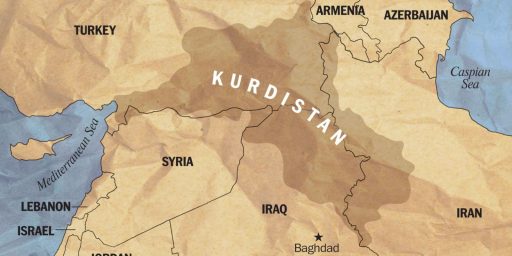Winning Iraq From Kurdistan?
Thomas Barnett, noting the remarkable success of Iraqi Kurdistan vis-a-vis the rest of the country, argues that we ought to take advantage of our good relationship with them in an intriguing way:
Yugoslavia didn’t fall into place in a day. It did so in sequential chunks. Recognizing Kurdistan-the-success is crucial to keeping the Big Bang sequential instead of cumulative.
Take what the board gives you, I say.
And pull most U.S. troops eventually back to Kurdistan. Don’t leave Iraq, but stay where you’re welcome and accept a certain commute for certain necessary activities.
Grow some lawn and stop only killing weeds. Then let others see where the grass is greener.
Demonstration effects make globalization go round.
Certainly not my first choice, given that withdrawal from the so-called Green Zone would be seen as a defeat. Still, it’s more plausible a plan for victory than withdrawing to Okinawa. And, at some point, we may be forced to chose between least bad options.






I’m curious, short of absolute stability and complete eradication of all terrorism activities by any group, when would you consider leaving the Green Zone (or Iraq all together) not a defeat?
For you guys (Right/Republicans), is there any withdraw situation that you would consider a non-defeat, that is even remotely possible in reality? I’m not trying to start a flame-war or anything here (really, I’m not), but I have yet to be told by a war supporter of any “victory” scenario short of turning Iraq into Kansas.
Do you have any evidence the Kurds would want us there any more than the rest of Iraq does?
It may be that a major reason the Kurds are doing so well is that the US is not there.
It may be that a major reason the Kurds are doing so well is that the US is not there.
On the contrary, the US has been there since 1991.
Protecting them from an external threat. The military is GOOD at this. But it is the ethnic uniformity, plus military protection, that has led to success in most of Kurdistan.
But, as Michael Totten reports from Kirkuk, the Kurds have just as many problems with the Arabs and Turkmen as we see between the Sunni and Shia in Baghdad.
Forced partition in these mixed areas seems like the only alternative to civil war.